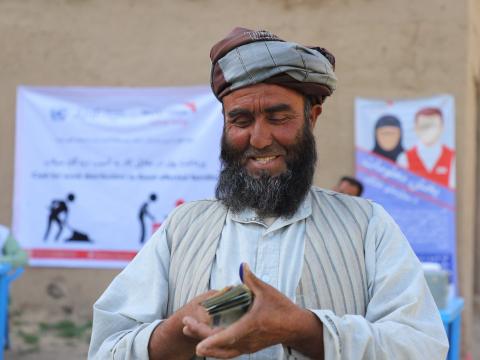Hoping to do more, for a livelihood recovery

Natural disasters resulted in acute food insecurity for many returnees and vulnerable host communities in Badghis province. Due to effects of the 2019 drought, most of the communities lost their livelihoods employment, agricultural productive assets, and livestock. Many experienced severe water shortages required for their agricultural use and had limited access to drinking water as well.
Ibrahim, 50, is one of many breadwinners who were hit hard by the droughts, yet continues to remain hopeful for the future. His family solely relies on farming as their source of livelihoods and this was wiped out by the seasonal drought experienced last year. Not only did they lose their income source but faced a problem in accessing drinking water too. Ibrahim says: “it took a while to walk miles to reach water sources for drinking”. Children were also bearing the brunt of the effects of drought. They had to walk for 3-4 hours to bring water home. “This made them tired and weary, he said!”
Due to the drastic effects of the drought, the community raised their plea for assistance to World Vision Afghanistan. It is through the Livelihoods Recovery Project that World Vision was able to provide emergency assistance to the most affected households. Under UNOCHA funded project and WV New Zealand as co fund entitled “Livelihood recovery for returnees and vulnerable host communities affected by drought in places of origin in Badghis Province, a number of initiatives were implemented. Amongst them was conditional cash assistance provided to 107 beneficiaries. This assistance was through the cash for work approach and not only did it create a safety net through employment creation, it also helped in the rehabilitation of community owned productive assets. As life-saving assistance, WVA facilitated cash for work activities to rehabilitate agricultural infrastructure and lands, gabion construction for the rehabilitation of river banks, and water conservation works. Beneficiaries selected from the most vulnerable households engaged in the cash for work activities for a duration of 2 months. After completion of works, each participating household was awarded USD 180 as per the FSAC food basket guidelines (USD 90 per month).
Ibrahim counts his money, with a smile on his face and says: “I am very happy with this initiative, I helped myself, my family and my community and I have the money too”. With the cash received, Ibrahim managed to construct two water conservation ponds “dabbas” and these will serve as a water source for his family members , his livestock, and his neighbors as well. He says: “I made one pond for my family to use water for drinking, and another one for livestock. In the past, we used a common pond for human consumption and for the livestock. This exposed my children to waterborne disease posing a major health threat”. He has planned to use some of the remaining money for the construction of yet another water pond, which will be of benefit to the wider community. “I hope to do more for my family and community” he says.
WV – Afghanistan continues to save lives in areas of highest need and give priority to families still suffering from consequences of the droughts.